How to Do Local SEO Strategy With MarketMuse
Local SEO Is Essential for All Businesses. Here’s Why.
When you think local SEO, you’re probably thinking local mom-and-pop stores who want to get some web presence in their area.
But optimizing for local SEO is important for all area-specific businesses, whether they be local or regional services like hospitals, lawyers or landscapers, or national brands with brick-and-mortar locations.
Ranking for local SEO is a little trickier than ranking in general. It takes a few tweaks to your content strategy process to get the right sets of eyes on your site.
When talking about local SEO tips, most SEO experts focus on local listings, getting online reviews, local citations and similar tasks.
In this post we cover three major tactical components of local SEO: local keyword research and targeting, Google My Business and SERP features, and content strategy for local SEO.

What Is Local SEO?
There’s SEO on a larger scale, where larger brands try to rank nationally, or even globally, for certain topics and keywords.
Then there’s SEO on a local scale, where a cafe, family doctor or a lawyer specializing in local property law, wants to rank only for locations in their own area.
Luckily, Google and other search engines take location into account when users search for services or brick-and-mortar stores.
There are two ways to rank locally: content-specific SEO and technical SEO.
From a content perspective, you want to optimize it for your locale. Think creatively about how to associate yourself with particular locations and be a thought leader in that space. This could mean news, local stats and data, key aspects (landmarks, popular locations, etc) of a locale that you should be talking about to signal that you are “about” a given area.
For technical SEO, you should understand the signals Google needs to help identify domains and pages for local SEO. A fundamental understanding of on-page SEO is also helpful.
At the basic level, you’ll need
- Google My Business (more on that later)
- Ownership of all of your social properties
- A presence on locally based review sites (Yelp, Thumbtack, etc.)
- A consistent name, address and phone number
- A site that’s optimized for mobile devices
- Structured data (schema) markup
Who Needs Local SEO?
There are three main types of businesses that care most about local SEO:
1. Small Local Brands
Small businesses in very specific areas, such as lawyers, dentists, insurance brokers or landscapers, want to rank for the customers they serve. It does a landscaper no good if his business is based in the greater Boston area and his site is popping up in searches for New York landscapers, or even landscapers in western Massachusetts. Those are not your potential customers.
2. Midsize Brands
Bigger brands that want to be national brands, but also have a strong local component, also need local SEO. This is especially true if they sell products everywhere, but they don’t necessarily have a physical location in a market they want to sell in.
3. National Brands
A big brand like the Home Depot will want their site to rank nationally over their competition, but they also want their stores to rank for their particular locations. They might care about ranking for a query like “mulch delivery Reading MA.” In that case, an SEO campaign would be devised to get their Reading branch to appear on the first page.
Keyword Research and Targeting
When it comes to local searches, there are two kinds of search queries: explicit intent and implied intent. When a user enters an explicit intent search query, they include a location in their query. For example, if you’re taking a vacation in San Francisco, you may get online and enter a query like “best places to eat in San Francisco” or “nightlife in San Francisco.”
A user enters an implied intent search query when they search for something without a location. Google thinks you want a local result and serves a map pack of results in your area. This is useful when you’re searching for any of the services we mentioned above.
But there’s a trick to keyword research for local SEO. If clients say they want to target a specific local intent keyword, they should use a browser that hasn’t collected any history or cookies.
Local queries, like ecommerce queries, can fluctuate tremendously in terms of their SERP pages due to local results and personalization.
You can do that in Google Chrome by clicking on the three dots in the top right corner and choosing New Incognito Window. This way, you can browse and search without the personalized results you would get using your everyday browser.
Here’s an example:
MarketMuse’s office is based in Brunswick, Georgia. If you type “lawn care Brunswick” and you’re in Georgia, Google will tailor your results to Brunswick, GA. If you were in Maine, you would see results for Brunswick, Maine.
Another way to get the same results is to type “lawn care near me.” Google then uses the location of your IP to give you relevant results.
If, however, you were in Canada and you typed “Lawn care Brunswick,” you would likely see results for lawn care in New Brunswick. If you were in a locale with no close location called Brunswick, Google would just pick something, because it doesn’t know what to do.
If you just type “lawn care” that is an implied intent. Google assumes you want something near you, but as a hedge, the SERP will include some broader results.
Think critically about what your organization wants to rank for, research if there is localization at play, and be sure to guide your company through those dynamics. It may be impossible to rank first for a query that Google is providing localized, personalized results on for every single searcher.
How to tell if a search query has localization at work on its SERP:
- Go into incognito mode.
- Search for a collection of queries. Try running searches with explicit locations, without those locations, and with different modifiers.
- You will have to do manual SERP analysis based on what the user types and where they are. Rank trackers alone can’t help you understand how a particular query is localized on SERPs.
- Note how the SERP changes for each modification you make.
If you’re in a particular area with your browser, are your results heavily localized? In what way are they localized?
If your results are different from a rank tracker like SEMrush or Ahrefs, you might be dealing with localization. For example, if the rank tracker’s server is in Russia, they will get skewed results.
By following the steps above, you’ll understand three things:
- What non-local, implied intent queries look like for people in your location
- What explicitly local search queries look like in your location
- What explicitly local queries look like for people outside your location
Let’s look at “Lawn care service” with the three above SERPs to understand how localization changes them. Please note that this is relative to Boston, MA.
Implied Intent Query: Lawn Care Service
Here’s what the SERP looks like.
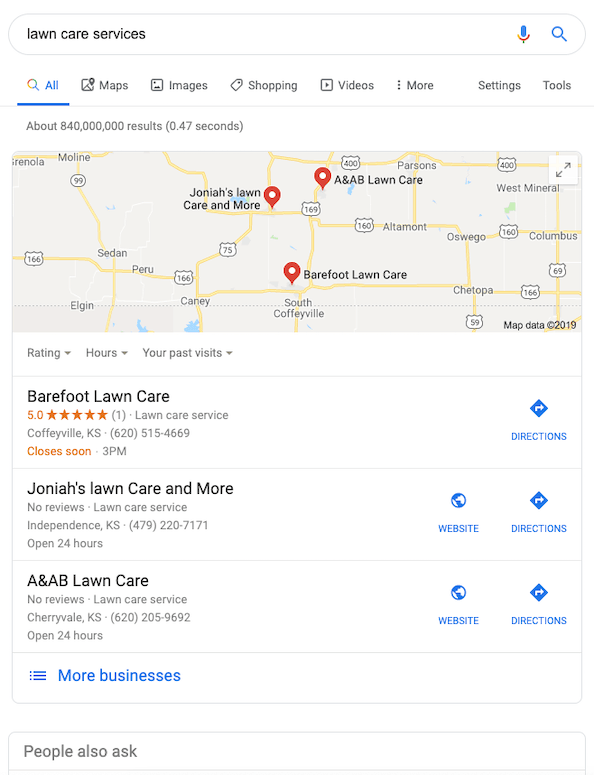
Predictably, we got a mix of business directories, authoritative local providers and some big box national providers. We also have some SERP features: ads, a map for local-area providers and a “People also asked” box.
This is an indicator of some intent fracture. Google is clearly favoring a purchase intent, but there are some informational features in there with the People also Asked box.
And while Google believes the implied intent is local in nature, there is yet more fracture due to the ambiguity of the query. The search engine can’t tell for sure if we truly want to find lawn care services in Boston. Even when local intent is implied, we still need to provide context for various user intents.
Explicit Local Intent Query: Lawn Care Service Boston MA
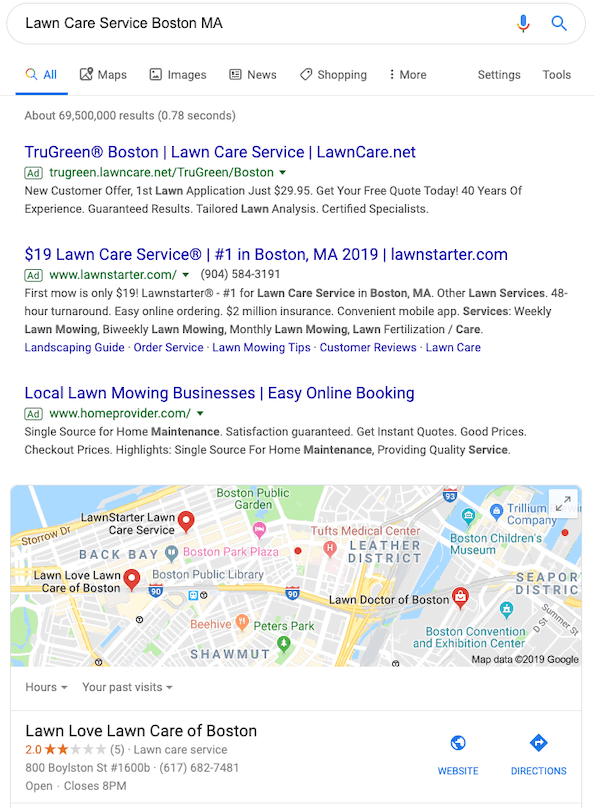
With the words Boston MA included in the query, there is no ambiguity. We got a map and locally targeted ads, and all of the results are authoritative local providers, business directories and review sites that help users compare and find a lawn care service in Boston.
Explicit Local Intent Query: Lawn Care Service Brunswick
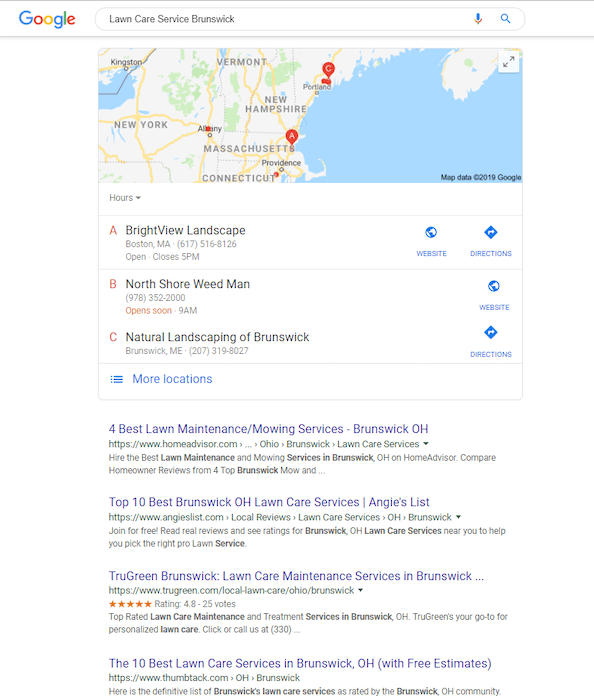
This SERP is all over the place. The map is showing locations in three states and the organic results show lawn care services in Brunswick, ME, Brunswick, OH, and Brunswick, GA. There are review sites, ads and few directories. We’ve confused Google.
What We’ve Learned
In general, if queries have local intent, keyword research is much more complex. The best way to do it is to go into Incognito Mode and look at many different SERPs to understand how they change. Then compare that against a rank tracker. If the results are different from what the rank tracker shows, there can be localization at play.
Google My Business
There’s more to local SEO and local SERPs than just maps. If you sell your products locally and you have your site and content structured properly, you can capture what’s called map packs and knowledge panels.
We googled “sandwich shops Boston” and got this map pack. It includes a map, the names of top results, their hours, their location, their Google rating and a brief description.
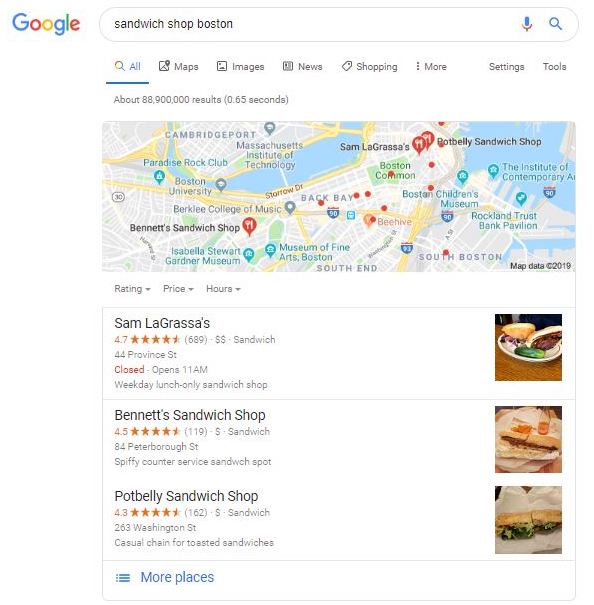
And if you’re Google My Business (GMB) profile is filled out right, and someone googles your business specifically, you will appear in the right rail in what’s called the knowledge panel.
The knowledge panel includes your address, website, contact information, ratings and other more detailed information appropriate for your type of business.
Here is what a knowledge panel for Sam Lagrassa’s, the top result for sandwich shops in Boston, looks like.
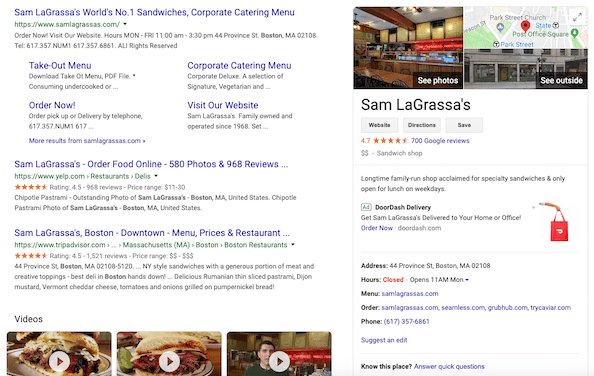
It continues down the page with reviews, popular times for customers, social media links and other helpful information.
To appear in those features, you need to register your business on Google My Business. Without claiming your GMB profile, getting featured in maps and knowledge panels is nearly impossible.
To get a GMB listing, you need a verified physical location you can register against an address. This address should be in the local you want to rank for.
You can get around GMB verification, but it’s a very black hat technique. We do not advise our clients to do this and we will not coach anyone on this. Faking a practice area and getting caught will result in being blacklisted from GMB, likely forever.
Some other advice you can give your clients for getting the most out of GMB:
- Get a bulk account and claim everything regarding your business. You will need that to scale.
- Audit your GMB categorization. Many issues businesses have with GMB are caused by incorrect categorization of their businesses.
- Audit GMB landing page links. Point them at the canonical location page. If there are no location pages, start thinking about rebuilding your location pages so they can support regularly updated content.
- Make sure tracking is set up correctly. Most organizations don’t have basic attribution tracking set up for GMB in their analytics, so there are no KPIs to track success.
- Keep tabs on your GMB listing. Since anyone can include edits on your business listing, it’s important to make sure your information is correct on a regular basis.
Content Strategy
The goal of any local content strategy is to show that you’re an expert in your topic area and industry. To do that, you need to dig deep into your field. The generic topics have already been done. Now it’s time to get into the nitty-gritty to rank.
SEO Fundamentals
With a local strategy, the fundamental ranking factors still hold true. So you need to structure your content correctly using pillar pages, landing pages and articles.
Pillar pages can be used for both general topic exploration and local focus, depending on the competitive landscape. They are the pages that address your main target topic and to which articles on subtopics and supporting topics point.
- What to do if you get a DUI in Massachusetts
- Guide to getting braces
- FAQs about being arrested in Florida
Landing pages are used to target a specific area for a specific thing. They are the pages people land on when they click through from an organic search. This is where your business description and keywords come into play.
- Personal injury attorney in Winthrop, MA
- Pediatrician Bar Harbor, ME
Article pages build authority with supporting content. They also help you expand your inventory and authority.
- Evergreen: What is grand theft auto in California?
- News: East Boston residents angered by bike lanes
Topic Research
Your content should cover news and trending topics as well as evergreen content. For example, if you’re a lawyer specializing in bike accidents, you can create content to address new city ordinances concerning bikes (your news content), but you should also have blog posts that address local traffic patterns that affect bikers (your evergreen content).
Remember, authority is still your objective. The goal is to provide content that not only adds value to the user, but helps search engines understand the connections between the subject matter expertise and local signals, as well.
It should also cover topics that are hyper-specific to your field of expertise. That will help you compete with existing content.
For bicycle accidents, for example, you could talk about bike safety, but that’s too generic. What do you know about bike accidents in your area? If it’s your bread and butter, you probably know everything there is to know about local statistics, traffic light changes, hills, dangerous roads, bike lanes, local workshops on bike safety, accidents, news, etc.
Turn that information into blog posts that local bike riders and biking advocates would find useful. Transform yourself into a local thought leader that others can turn to for trustworthy information. By doing so, you’re putting your brand top-of-mind when people think of bike litigation.
Get ahead of the game. Understand your area, its history and specific information about locales. Provide content that answers specific questions about bike accidents in your area, and what users should do if they are in one.
Don’t just write “bike safety Boise.” That might work for large organizations with a national presence. But if you want to rank well, a better marketing strategy is show you’re the expert with super-targeted content.
Featured Snippets
If your content is superior to that of other content producers in your niche, or if there is no content at all (which often happens in local SEO), you have the opportunity to capture another SERP feature called featured snippets.
Featured snippets are generated by how well your content matches an organic search term. Here’s an example for “history of Boston Children’s Hospital”

It includes the beginning of a blog post on the hospital’s own site and a link to the rest of the text.
Strategies That Help You Compete
There are some other methods you can use to get your content to rank, win feature snippets and outdo your competitors’.
- Look for low-quality content that is doing well for local SERPs. You can jump in and take their ranks with better content.
- If you don’t have a verified address in a location, it will take a substantial investment to beat truly local competitors that have an address.
- Look at keyword variants in a tool like MarketMuse. Use the Research/Compete function to build out local content based on topic clusters. By doing so, you’ll be covering every angle of a topic and showing Google you have the kind of rich content that satisfies user intent.
- One weakness for major companies is that their content is often auto-generated at scale. For example, Expedia has auto-generate content templates. Their category pages rank for thousands of words, even though the pages doesn’t service those intents. If your pages are ranking for variants, find useful ones and write content to them. Intent mismatch for local is an easy way to win.
Content Strategy Scenarios
Scenario: A law firm in Wilmington, NC, that specializes in criminal drug charges
Possible Strategy:
- Pillar page: Everything to know about criminal drug charges in North Carolina
- Landing page: One for each location they serve
- Wilmington drug defense attorney
- Fayetteville drug defense attorney
- Jacksonville drug defense attorney
- Article pages: to support the pillar and expand user intent
- Evergreen: What does possession with intent to sell mean in NC?
- News: Wilmington launches new drug task force to combat the opioid epidemic
Here’s an example of what that looks like mapped out:

Summary
Getting to the heart of a successful local SEO strategy takes thorough keyword research, a solid content strategy and a presence on GMB. And even when all that work is done, brands will need to take the time to monitor, audit and improve their content on a regular basis. Search engine optimization for local business can be just as demanding as traditional SEO efforts.
Pay close attention to how your business shows up on Google, maintain a deep understanding of how your area of expertise relates to your target community and create a solid content strategy that truly satisfies user intent.
What you should do now
When you’re ready… here are 3 ways we can help you publish better content, faster:
- Book time with MarketMuse Schedule a live demo with one of our strategists to see how MarketMuse can help your team reach their content goals.
- If you’d like to learn how to create better content faster, visit our blog. It’s full of resources to help scale content.
- If you know another marketer who’d enjoy reading this page, share it with them via email, LinkedIn, Twitter, or Facebook.
